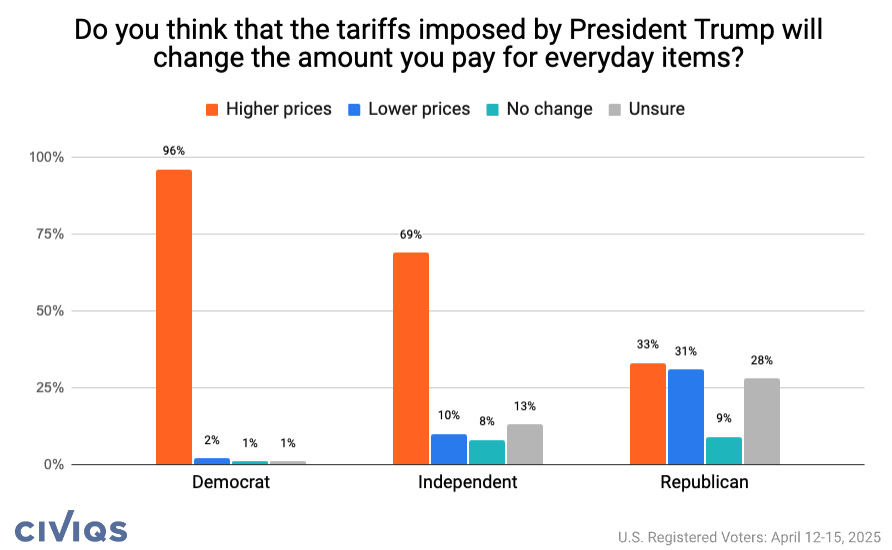Report: Americans Say Trump’s Tariffs Will Raise Prices
The April 2025 Daily Kos/Civiqs Poll asked 1,124 registered voters in the United States about their opinions of President Trump, his economic and immigration policies, DOGE, national security, and vaccines.
Presidential Approval and Tariffs
A majority of Americans (53%) oppose President Trump's tariffs, while 45% of the public supports them. Despite 67% of Americans believing these tariffs will increase prices, a smaller number of them (53%) think Congress should limit Trump's tariffs. Nearly all Democrats (96%) and 69% of Independents believe that these tariffs will lead to higher prices, and even a plurality of Republicans (33%) agree.

On President Trump’s overall job performance, 46% of voters approve (39% strongly, 7% somewhat) versus 53% who disapprove (50% strongly, 3% somewhat). This split reflects deep partisan divides — 94% of Democrats strongly disapprove, while 81% of Republicans strongly approve. Independents lean negative, with 48% strongly disapproving.
Trump’s handling of the economy shows similar partisan polarization, with 46% of Americans approving and 54% disapproving. Among Republicans, 71% strongly approve of Trump's economic leadership, while 89% of Democrats strongly disapprove. Independents again lean negative, with 48% strongly disapproving.
Americans are more closely divided on President Trump’s immigration policies, with 49% approving versus 51% disapproving. Republicans show near-unanimous approval with 86% strongly approving, while Democrats remain strongly opposed (82%). While a majority of Independents disapprove (54%), a smaller number (42%) strongly disapprove.
Immigration, Foreign Policy, and Public Health
As the Trump administration continues with plans to arrest and deport immigrants who are in the United States legally, 63% of Americans oppose deporting legal immigrants, while 27% support such actions. Party affiliation strongly influences these views as 87% of Democrats oppose deportations of legal immigrants, compared to 37% of Republicans. Independents align more with Democrats, with 62% opposing deportations.
Regarding visa restrictions for college students engaged in activism, 49% of voters oppose restrictions while 45% support them. The partisan divide is even more extreme: 86% of Republicans support restrictions while 89% of Democrats oppose them. Independents are evenly split (47% support, 47% oppose).
On foreign policy, Americans overall show skepticism toward territorial expansion. More than half (57%) view acquisition of countries like Canada and Greenland as a "bad idea," while 25% think it's a "good idea" and 18% are unsure.
Public health perspectives reveal broader consensus. A strong majority of Americans (79%) view vaccinations as important for children, with only 11% disagreeing. This view transcends partisanship, as 96% of Democrats, 63% of Republicans, and 75% of Independents agree on the importance of childhood vaccinations. Similarly, 79% of voters consider vaccines safe (49% very safe, 30% somewhat safe). There is a stronger partisan divide on this question: 85% of Democrats view vaccines as "very safe" compared to just 15% of Republicans. However, 95% of Democrats, 80% of Independents, and 62% of Republicans consider vaccines at least somewhat safe.
DOGE and National Security
The Department of Government Efficiency (DOGE) divides public opinion, with 46% of Americans viewing it favorably against 51% who view it unfavorably. This reflects extreme partisan positions — 89% of Republicans view DOGE favorably while 93% of Democrats hold unfavorable opinions. Independents lean negative at 49% unfavorable to 47% favorable.
Americans are similarly divided on DOGE's federal workforce reductions: 46% see the firings as positive while 52% view them negatively. Among Republicans, 91% approve of the firings, while 94% of Democrats think they are a bad thing. A similar pattern repeats regarding DOGE's agency funding cuts, with 47% of all voters supporting reductions and 52% opposing. Voters’ opinions have not substantially changed since the same questions were asked in the March Daily Kos/Civiqs poll.
On national security, 75% of Americans believe those responsible for sharing classified military information in a Signal chat should face consequences (51% fired, 24% disciplined), with only 17% opposing action. Support for consequences includes 96% of Democrats, 73% of Independents, and 53% of Republicans. More Republicans would prefer that the people responsible for the Signal chat be disciplined, while more Democrats and Independents think they should be fired.
There is not much support for President Trump’s suggestion that individuals who he pardoned following their participation in the January 6th, 2021 riot at the U.S. Capitol should receive compensation. Only 33% of voters overall support compensating the pardoned rioters (18% strongly, 15% somewhat) while 60% oppose it (54% strongly, 6% somewhat). However, 68% of Republican voters now support offering compensation to these individuals.
Civiqs surveyed 1,124 registered voters in the United States from April 12-15, 2025. The survey was conducted online, among selected members of the Civiqs research panel. Sampled individuals were emailed by Civiqs and responded using a personalized link to the survey at civiqs.com. The survey results are weighted by age, race, gender, education, party identification, and region to be representative of the population of registered voters in the United States. The general design effect due to weighting is 1.09. The survey has a margin of error of ±3.1% at the 95% confidence level, accounting for the design effect.
Download the survey methodology and crosstabs
Interested in conducting a survey? Speak with a Civiqs Analyst.
Want Civiqs updates in your inbox? Sign up for our newsletter, Immediate Reaction.